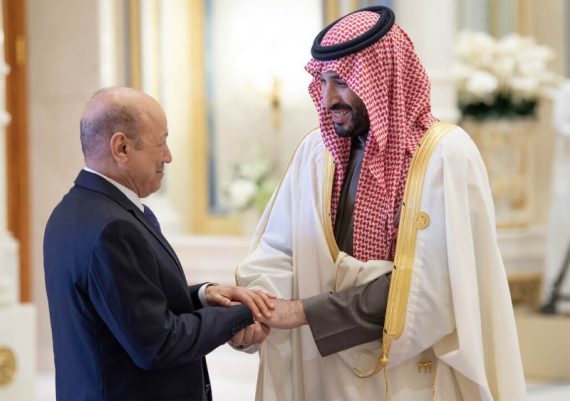T
he process that began in the Red Sea when the Houthis targeted commercial vessels they claimed were linked to Israel quickly expanded and turned into a hot conflict. Since November 2023, the number of attacks has reached nearly 30 while the attacks have begun to include Western countries, such as the United States, in addition to Israel. In this context, on December 18, 2023, the United States launched the international naval coalition “Operation Prosperity Guardian.”
On January 22, the coalition expanded with the support of the UK, Canada, the Netherlands, and Bahrain, and carried out air strikes on some of the Houthis’ military positions in Yemen. The Houthi attacks in the Red Sea and the U.S.- and UK-led air strikes against the Houthis have had a direct impact on the regional and global balance of power. In this new geopolitical climate, the Gulf states have adopted a cautious policy.
Saudi Arabia’s balancing policy
Despite the U.S. and UK air strikes in Yemen in January, Houthi activity in the Red Sea did not stop. In fact, the Houthis demonstrated their ability to threaten maritime trade by targeting a U.S. ship on January 18, a development which worried regional players, especially Saudi Arabia. Although the U.S. supported the Saudi-led Operation Decisive Storm against the Houthis in 2015, the Riyadh regime adopted a cautious stance towards the U.S.-UK offensive in Yemen. Foreign Minister Prince Faisal bin Farhan announced that the Kingdom of Saudi Arabia was concerned about the situation in Yemen. The Saudi minister said that the region was going through a very dangerous and difficult process and called for a reduction in regional tensions.
Saudi Arabia’s statements to this effect coincided with the kingdom’s attempts to strengthen relations with the U.S., while at the same time engaging in diplomatic negotiations with Iran and the Houthis. Saudi Arabia has been conducting negotiations with the Houthis under the auspices of the United Nations since April 2022 and has also normalized diplomatic relations with Iran under the auspices of China. Expressing direct support for the U.S. and UK strikes against the Houthis would jeopardize the aforementioned normalization and diplomatic negotiation processes, so Saudi Arabia has preferred a policy of cautious balance. In other words, while Saudi Arabia is strengthening its security ties with the U.S., it does not want to destroy the diplomatic processes it is conducting with the Houthis and Iran.
Indeed, for the Saudis, who are prioritizing economic growth as part of their 2030 vision, the climate of conflict on their southern border could be detrimental to this transformation. In this sense, the government in Riyadh is trying to stay away from the conflict and crisis between the Houthis and the U.S. and UK, and is developing a discourse to calm tensions. However, Saudi Arabia’s lack of active involvement alongside the U.S. and the UK poses security risks.
Staying away from the military operation organized by the U.S. and the UK against the Houthis, who attacked Saudi Aramco’s oil facilities in 2019 and 2022, could create new challenges for Saudi Arabia. The Riyadh government will most probably turn to the option of military activation in a scenario where the Houthis become stronger after the attacks and threaten the Kingdom-backed Presidential Council and the security of Saudi Arabia.
What is behind the Saudis’ failure to take the expected pro-Western stance against the Houthi attacks is the Saudi vision of relations with Washington. In the context of regional tensions, which have been increasing by the day since October 2023, Saudi Arabia is strengthening its relations with the U.S. and sending a message to other actors. Yet, despite its extensive defense cooperation with the U.S., Saudi Arabia is also trying to show that it is not in an alliance with the White House, given the hostility generated by the Houthis towards Washington.
However, it is difficult for Saudi Arabia to challenge the United States directly, considering that almost 80% of the conventional weapons used by Saudi Arabia in Yemen, amounting to $37 billion between 2016 and 2020, were supplied by the United States. The possibility of security suppliers such as China or Russia replacing the United States is quite remote for Riyadh. Finally, by stopping the Houthis’ missiles against Israel in its own airspace, Saudi Arabia is trying to prove itself in terms of establishing sovereignty and security. The situation also shows signs of a shift in Saudi Arabia’s national security policy under the de facto leadership of Mohammed bin Salman.
The cautious policies of the UAE, Oman, Qatar, and Kuwait
Yemen’s eastern neighbor, Oman, has adopted a similar stance to Saudi Arabia. Foreign Minister Badr Al-Busaidi noted that the U.S. and UK attacks were carried out against Oman’s recommendations and would further fuel the dangerous atmosphere in the region. Oman has condemned the air strikes on Yemen by friendly countries, referring to the U.S. and UK, and is known as a proactive actor in the peace talks in Yemen. Like Oman, the United Arab Emirates (UAE) and Kuwait have stated that they are concerned about the rising tensions in the Bab-el-Mandeb and the Red Sea. Qatar’s Foreign Ministry has refrained from making an official statement on the process.
Overall, it can be said that a consensus has been reached for almost all Gulf countries that the Houthis’ operations in the Red Sea and the U.S.- and UK-led attacks against the Houthis in Yemen will increase regional tensions and deepen instability.
The Bahrain exception
Bahrain has stood out from other actors in the Gulf by directly supporting the U.S.- and UK-led attacks. Bahrain’s active policy is influenced by at least three factors. The first relates to Bahrain’s relations with the U.S. Manama, which hosts the U.S. Fifth Fleet, has signed a comprehensive defense agreement with the United States in recent months. The fact that U.S. Secretary of State Anthony Blinken has visited Bahrain twice while Israel’s recent offensive/war on Gaza continues shows that Washington sees Manama as an important player in the regional diplomatic and security equation. Bahrain, which is under direct pressure from the U.S., is different from other Gulf states and is more dependent on Washington’s security umbrella than other actors in the Gulf. This dependence leads Manama to pursue a security and foreign policy on the U.S. radar, and to support the attacks on the Houthis directed by the U.S.
The second factor relates to the fact that Bahrain is one of the countries that feels most threatened by Iran and Iranian proxies in the Gulf. Bahrain, which has a significant Shia population, is disturbed by the Iranian-backed Shia Houthis controlling Yemen. Indeed, Shia activists such as Abdulhadi al-Khawaja posed a direct threat to the Bahraini regime during the 2011 protests and were subsequently imprisoned. Furthermore, in 2021, Bahrain declared that terrorist groups linked to Iran were planning a coup against the government. Thus, by siding with the U.S., the Manama government is hoping to balance Iran, which it perceives as a geopolitical threat. The third and last factor concerns Bahrain’s normalization with Israel in 2020 which has also influenced this process. Bahrain can be said to have adopted a pro-Israeli stance after establishing diplomatic relations with Tel Aviv.
Recommended
Regional and global implications
The tensions in the Red Sea and Bab-el-Mandeb correspond to more than one point in terms of global and regional politics. The Red Sea and Bab-el-Mandeb are crucial chokepoints for global maritime trade. A significant portion of the world’s trade, including oil and natural gas shipments, passes through these narrow waterways. Any disruption or escalation of tensions in this region can have a direct impact on the global economy.
The Red Sea region is strategically important for major global and regional powers. Various countries, including the United States, China, Russia, and regional players like Saudi Arabia and Iran, have interests in maintaining stability and influence in this area. The first point relates to the re-establishment of U.S. and UK deterrence. Although symbolic military operations have been carried out, the U.S. and the UK want to strengthen their deterrence and image by attacking the Houthis.
Second, the strikes in Yemen have not created a balance of power against the Houthis. According to many analysts, the U.S.- and UK-led strikes may actually strengthen the Houthis in southern Yemen.
Third, attacks against the Houthis may increase anti-American sentiment among Middle Easterners who oppose foreign intervention. This process could also provide “legitimacy” to the Houthis, who use the narrative that they are fighting the United States.
Fourth, the Houthis can manage the governance problem and the humanitarian crisis in Yemen through the narrative that they are fighting the U.S. and its supporters. In other words, the Houthis are trying to cover up their failed governance in Yemen and the humanitarian crisis which is deepening day by day with the rhetoric of fighting the “external enemy.”
Fifth, the U.S. and UK attacks provide the Houthis with an opportunity to recruit and mobilize fighters through the “external enemy” narrative. In this sense, the Houthis are reported to have recruited many new fighters to Al-Qassam Brigades.
Finally, the attacks against the Houthis and the relisting of the Houthis on the U.S. terrorist list will deepen the humanitarian crisis in Yemen and cause the displacement of many more innocent civilians. The attacks against the Houthis will not contribute to the peace process in Yemen.
As a result of all the above considerations, with the exception of Bahrain, the Gulf states have reached a consensus that the U.S.- and UK-led attacks against the Houthis are not the right step to solve the Yemeni crisis, and have adopted a cautious balancing policy in the process.





